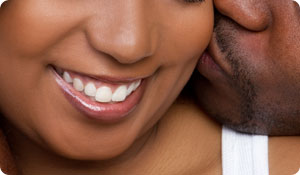
Kissing is a great way to show your affection. But did you know that a greeting from someone else's lips can spark a serious reaction if you suffer from a food or medication allergy? Learn how best to protect yourself from before you pucker up.
The Danger of Kissing Allergies
If you're not familiar with the concept of kissing allergies, you're not alone. This isn't an allergy that affects many people. But if you have very severe allergic reactions, a danger exists when you have intimate contact with someone who has eaten food or taken medication to which you're allergic. Furthermore, according to researchers who studied kissing allergies and presented their findings at the 2010 annual meeting of the American College of Allergy, Asthma, and Immunology (ACAAI), the danger of second-hand exposure exists in circumstances beyond what you might expect.
The scientists believe that common allergy preventive tactics non-allergic partners may take such as brushing teeth, chewing gum, or waiting a few hours between consuming an allergen may not be enough. The reason these steps may not be effective is because the trigger can be excreted through saliva for at least several hours after ingestion. And even a peck on the forehead or cheek can be enough to trigger a reaction.
This means it's ultra important to avoid intimate contact for 24 hours.
Kissing Allergy Symptoms
Some of the types of symptoms that can be caused by a kissing allergy include:
- Swelling of lips or throat
- Rash or hives
- Itching
- Wheezing
- Vomiting
What You Can Do
If you're worried about the dangers kissing may pose for you, it's important to keep the situation in perspective. Only a small number of people actually have this highly sensitive reaction, although the danger of it occurring is very real. This means that if you suffer from serious food allergies, it's best to always proceed cautiously with any intimate contact.
ACAAI experts say that the best way to protect yourself is to have your partner refrain from eating or drinking anything you're allergic to for 24 hours before having contact with you. It's also essential that you let your family, friends, and colleagues know about your situation, too. Alerting people to this very real risk can be lifesaving. In addition, always check first before you kiss, so you can avoid taking any unnecessary risks.
Sources:
If Kissing or Sex Leaves You Tingly, is it Love or Allergies? American College of Allergy, Asthma and Immunology. ACAAI, 14 Nov. 2010. Web. 10 Dec. 2010.
"Kiss of Death? For Allergy Sufferers, Locking Lips Can Kill." CBS News Health Watch. CBSnews.com, 22 Nov. 2010. Web. 10 Dec. 2010.
"When Romance and Allergies Don't Mix." HealthFinder.gov. US Department of Health and Human Services, 14 Nov. 2010. Web. 10 Dec. 2010.





